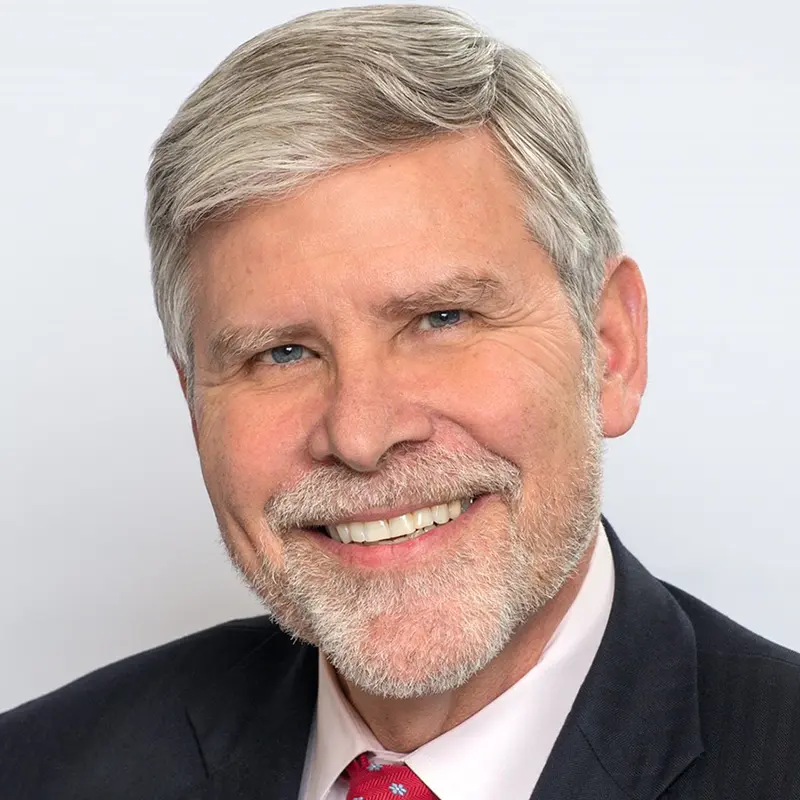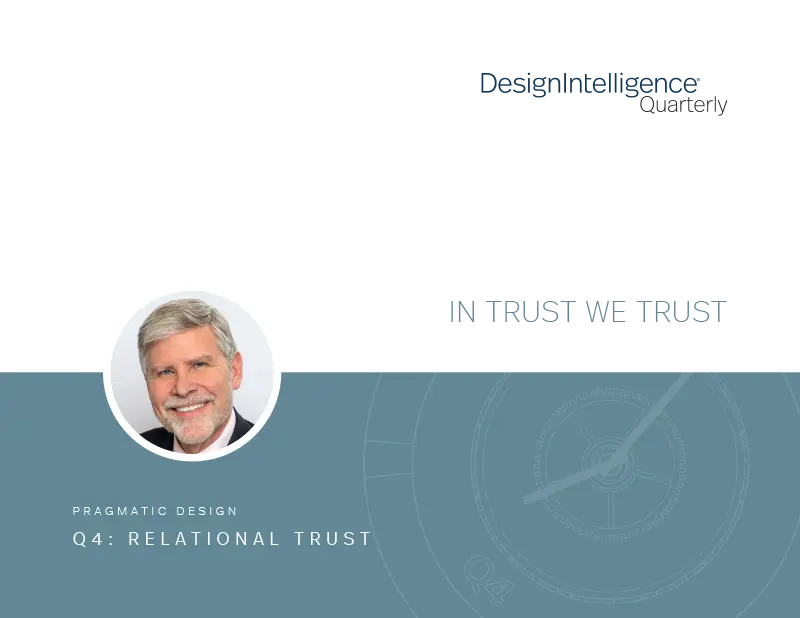In Trust We Trust
by Scott Simpson
Senior Fellow in the Design Futures Council
October 25, 2023
Scott Simpson reminds us that trust is a leader’s only currency.
On the back of every dollar bill there’s a familiar phrase: “In God We Trust.” Yet nobody’s ever seen “God” in person, and “God” has multiple meanings and interpretations depending upon one’s religious perspective (or lack thereof). The U.S. Constitution is notably clear on the principle of separation of church and state, and yet this unabashed reference to the divine prominently adorns our currency. What’s up with that?
Also consider what “we” means. Just exactly who is, or are, the “we” in this context? It suggests a collective body politic, to be sure, but the people who comprise “we” come in many different shapes and sizes and possess widely divergent opinions and beliefs. What is it that binds them together in a sufficiently inclusive way to deserve top billing on the currency?
A dollar may seem like a real thing. It declares itself to be “legal tender for all debts, public and private,” which is a rather sweeping statement. But the truth is that its value can fluctuate daily as currency markets ebb and flow. The dollar has lost more than 90% of its purchasing power over the last five decades. Viewed in that context, a dollar is really only a dime, and before too long may devolve to being a penny.
It’s the last word, “trust,” that gives the proposition its meaning. The true value of a dollar is ephemeral at best; it is worth only what we think it is at any given moment. There was a time when U.S. currency was legitimized by the nation’s gold reserves, but that relationship was ended by President Nixon in 1971. As a result, dollars were no longer backed up by hard assets — only by the public’s trust in the soundness of the currency. Like Tinkerbell in “Peter Pan,” the dollar only works if you believe in it.
These same dynamics hold for private relationships. The average person may have a dozen or so close friends and perhaps several hundred acquaintances, but there is no way everyone can have a meaningful personal relationship with everyone else. To put that in mathematical terms, someone with a connection of some kind to 1,000 other people only knows .0000003 of the U.S. population — a number so small it’s essentially zero. The rest must operate on the basis of trust.

Trust is a funny thing. It’s both fragile and enormously powerful. Trust takes a long time to build, but it can be shattered in a single careless moment. Like gravity, we cannot see it, taste it or smell it, but its effect is palpable and undeniable. Without trust, life’s normal activities would be impossible.
Exercising the power of trust is one of the most important things leaders do. It was trust that enabled George Washington to hold together the ragtag Continental army in Valley Forge during the bitter winter of 1777. The soldiers had no food, blankets or weapons, but they had trust in their leader. Absent that trust, it is a certainty that the army would have dissolved.
Because trust is the ultimate form of currency in personal relationships, it must be spent wisely and well. Trust cannot be bought; it must be earned, one person at a time. The primary attributes of trust are predictability and consistency. When a promise is made, it must be kept, and when enough promises are made and subsequently fulfilled, trust begins to form. Properly nurtured, trust strengthens over time, and if it becomes strong enough, it can weather an occasional lapse or two. However, once broken, trust is extremely difficult, if not impossible, to restore in its entirety. People who intentionally break a vow may never regain full trust no matter how repentant they may be.
That is not to say that trust cannot admit to making mistakes. Believe it or not, human beings are imperfect, and despite the best intentions, they do not always perform as expected. When errors are made but then admitted, they can be repaired. In fact, a momentary lapse can strengthen trust if it is dealt with in a forthright manner.
What does this mean for leaders in the design professions? The nature of the business is that it largely deals with unknowns. Because design is a journey of discovery, the ultimate outcome is not defined at the outset of a project. There may be plenty of good intentions all around, but every design team must navigate a host of variables (some expected but many not) and despite best efforts, not all the initial promises may be kept. Does this mean that designers are inherently untrustworthy, making promises they are unlikely to keep? (After all, 30% of all projects in the U.S. do not meet schedule or budget.)
The answer is: It depends. Claims of “we exceed expectations” or “we will deliver on time and within budget” or “we will create the best (fill in the blank) ever” are unlikely to be met and of course should be taken with a grain of salt. However, a pledge to devote “our best effort” to achieving those same goals will be much more credible.
To be effective, design professionals need to develop deep trusting relationships with a wide variety of people: clients, consultants, contractors and review agencies having jurisdiction over the project, not to mention their own internal staff. In addition, there is a nascent trust relationship with thousands of people whom the designers have not yet met: the end users and the public at large. It follows that the ability to build and maintain trust is a key skill in the designer’s toolbox.

With that in mind, it’s odd that “trust” is not part of the curriculum in design schools. Perhaps that’s because the need for trust is so pervasive it’s simply taken for granted, like the air we breathe. After all, when people walk into a building, they assume without thinking that the building codes have been complied with, the structure is sufficiently strong, the lights will turn on and the plumbing will work.

Successful firm leaders do not take trust for granted. Trust, and its corollary loyalty, are the table stakes for any leader’s ability to inspire people to do their best work. Effective leaders continually focus on developing trust among their colleagues. When they have done so, they pay special attention to maintaining that trust, knowing their credibility as leaders, just like the value of a dollar bill, can fluctuate based on any given transaction. In the final analysis, trust is a leader’s only currency. Like the mortar in a brick wall, it’s what holds things in place.
Scott Simpson is a senior fellow in the Design Futures Council and a regular contributor to DesignIntelligence.


